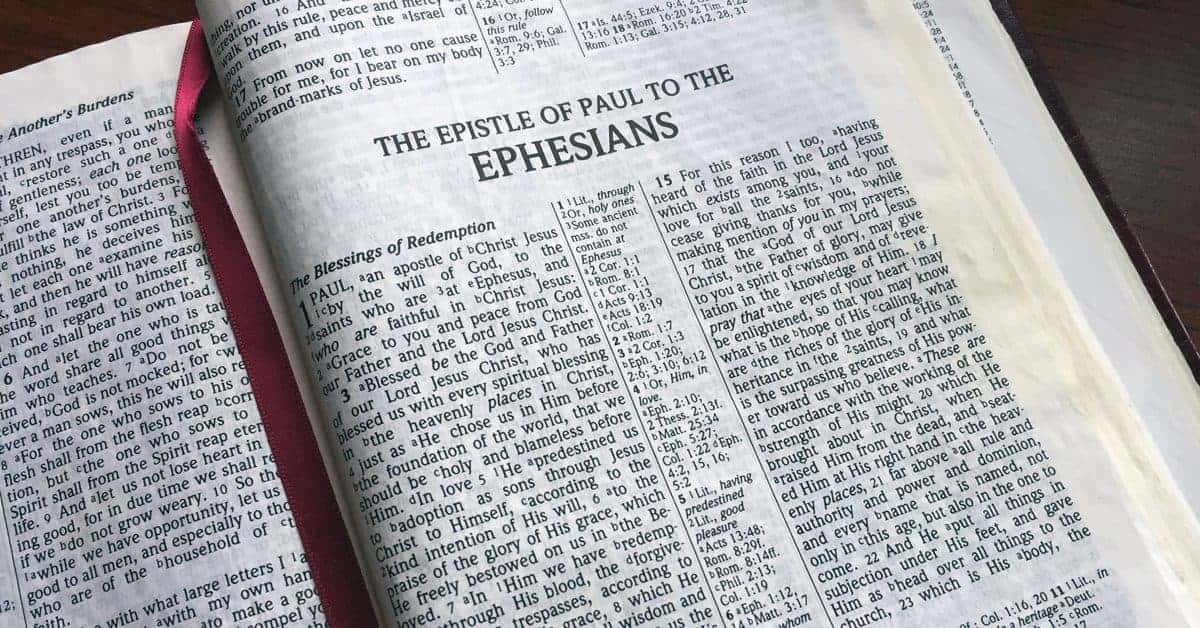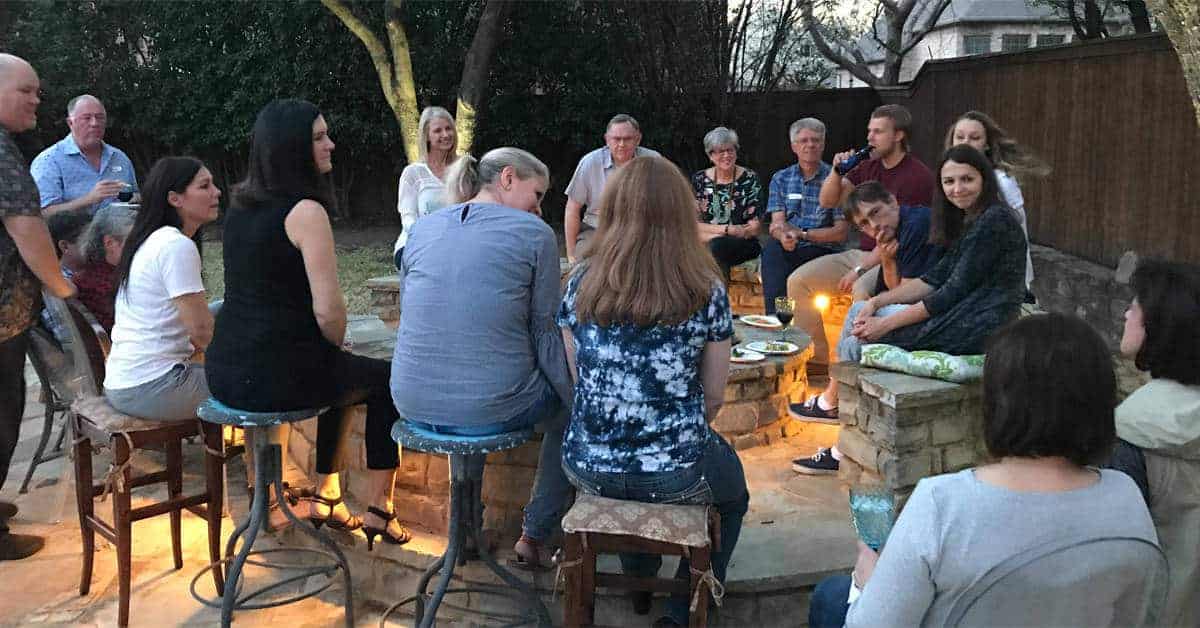By Wayne Jacobsen in a continuing series on The Phenomenon of the Dones.
The sunshine was brilliant as we gathered in a field along the English coast with some of our friends from throughout Europe. I sat down next to Dave, a former South African now residing in Ireland. As we got reacquainted he asked with just a touch of mischief in his voice, “Do you know what I’ve been thinking about these days?”
Of course I did! I know Dave can be playful, but he is a serious follower of Jesus and a provocative thinker.
He leaned over and in a surreptitious whisper and said, “I’ve been wondering just how much Paul got it wrong.”
I just shook my head chuckling wondering where this would lead. It was a loaded question to be sure though our ensuing conversation helped clarify that he was less focused on what Paul got wrong as he was how we wrongly we interpret Paul. We read his letters as if he wrote them last week to the denominations and mega-churches of the 21st century. The early believers he was writing to, however, were not organized into efficient institutions with complicated political and economic structures. We mistakenly assume when Paul wrote about worship he was referring to the songs and prayers we use to start a service, teaching as a lecture to a room of passive listeners, or that elders were the business leaders who made financial decisions for the corporation or even pastor-preneurs carving out a niche in the religious landscape for themselves.
We forget that the early believers didn’t do anything that resembled the way most congregations meet today and when we co-opt the same terminology to justify our structures, we get Paul entirely wrong. For the most part the new believers comprised informal networks of those who gathered around specific households. While those in Corinth gathered on the first day of the week, we don’t know that every one else did. Paul even wrote to the Romans that some might consider a specific day special and others all the same and there was freedom in Christ for that.
But we are certain those believers didn’t sit in pews watching a production on stage, nor that they allowed a single person to dominate the life of the congregation. When that happened in Ephesus, John called out Diotrephes as evil (3 John 9-11) for lording it over the others. At the same time he affirms Demetrius for the quality of his life. Do we really imagine that these two were pitted against each other in board meeting for control of the congregation? They were not that centralized until later as human leaders wanted the same kind of control over the faithful that Diotrephes held.
No, I don’t think Paul got it wrong. I appreciate everything he wrote and the invitation he gave to live in a vibrant relationship with Jesus rather than get sucked into living by law, or in submitted compliance to so-called leaders who want people to follow them instead of following Christ. Many mistakenly think that Paul’s writings are our guide for right faith and practice, completely ignoring Jesus’ words that he would send us his Spirit and that he would guide us into all truth. Jesus never even mentioned that a collection of writings would one day come together to make following his Spirit obsolete. Even Paul would abhor much of how we apply his writings today. He wrote to encourage people to follow the Spirit rather than to craft a New Testament code of ethics or set up a hierarchy of leadership to guide us.
I believe the Bible is a God-inspired collection of writings to give us the truth about God and how he revealed himself in the world, but it is designed to equip us to live a life in the Spirit, not to replace him or his touch in our lives. You can tell when someone is interpreting Paul with the blinders of their religious institutions when they use his quotes to justify the religious systems they seek to employ. Their conclusions will reflect far more the management styles of the world than they do the vibrant community of the new creation. While Paul uses similar words as pastor and elder, what he means by them is markedly different than how we use them today. He was talking about older brothers and sisters with character who can discern between true and false living while encouraging younger believers to a more genuine faith, not about those with a seminary pedigree and the charisma to draw a crowd.
One of the glaring differences when you read Paul and look at how most people think of church today, it moved from being a “we” to being an “it.” It lost its vitality as a community of the redeemed sharing their joy and gifts, and became an institution that seeks control over Christ’s followers. I appeared on a radio discussion not long ago on the topic, “Is Church Attendance Mandatory?” I was asked to explain why so many people are leaving traditional Christian institutions and whether or not they could still be considered followers of Christ. The discussion was amiable enough but as my host signed off she used a well-known quote from Cyprian, the Bishop of Carthage in the middle of the third century. “He can no longer have God for his Father who has not the church for his mother.” Her conclusion was clear, you cannot be a follower of Christ if you’re outside a local, sanctioned institution. I would love to see how Paul would respond to that!
The quote is silly on the face of it. If we as God’s children comprise the church then how can we be our own mother? We are siblings with God as Father and Christ our Head. As far as I know Cyprian’s statement is one of the first that redefined the church from a “we” to an “it.” And this “it” is a mother demanding our obedience and conformity. In doing so the early bishops quite intentionally exalted themselves above the family and inserted themselves as mediators between Jesus and his followers. You follow him by following “it.”
Less than 250 years after Christ died and Paul wrote his letters, the freedom of the new creation had been fully crushed by the institution that calls itself “church.” And it is even more distressing that a Protestant in our day would appeal to such a quote, since Cyprian’s context was that of the Chair of Peter specifically. My host was already out of compliance to the mandatory allegiance to which she referred. The irony was perhaps lost to her since Protestants claim the same fidelity to their systems that the early bishops demanded of theirs.
Isn’t this when things went horribly wrong? People no longer were invited to follow Christ; they had their bishop to follow or rituals to observe, mostly based on someone’s interpretations of Paul’s writings. I’ve always wondered how one can know God as Father and end up so far afield? And why would they be so convinced of it that they would damn any who disagree with them? If you don’t attend our meetings, participate in our rituals, join our membership, or sign our covenant, you are excluded from Christ and his salvation.
And I do understand the concerns today. Many who claim to follow Jesus are only following their own self-interest and stumble off into error. It’s easy to think that the institutional control of “more mature” brothers and sisters would fix that problem. But it doesn’t; it only shifts the problem. It stagnates the spiritual growth of more sincere people by taking their eyes off of Jesus and when the size of any institution grows it easily seduces those who lead it to serve their own self interest, especially where income and ego are involved.
The only way to guarantee the future of a corporation is to make people dependent on it by making it mandatory for salvation. I remember the things I used to defend when my income directly benefited from my theology. It obscures our thinking more than we know. But to double-down on the mandatory card is to ignore the reality of the Incarnation, the nature of the new creation, and the identity of his church growing in the world. Jesus came to be with us, not just while he was in the flesh, but now by the power of the Spirit.
If whatever we call “church” is not as engaging as Jesus was on the planet, then maybe we’re not talking about his church. It certainly wasn’t what Paul was describing, nor the reality he wrote to. Whether we belong to Jesus or not is demonstrated not by our attendance at a weekly meeting, but by his character taking shape in us and how we love those around us.
Paul said this was a freedom worth fighting for. He warned about people “cutting in” on them with rules and obligations, of being robbed of their freedom, and told them not “Let anyone tell you what you should do…” He made no exceptions for bishops or pastors. He wanted people following Christ as he made himself known, not substituting any one or anything for that vibrancy of life in him.
The life of the church will never be found in accountability to people or systems, but in the love of Christ taking root in our lives. For that it needs a growing number of people who take following Christ seriously and themselves less so. It is worth risking the anger and judgment of those who seek to steal that freedom and learn how to recognize his work in you. You follow Jesus, by actually following Jesus not by living up to the expectations of those who set themselves up as leaders.
That is such a foreign concept to people, that when many leave a congregation they feel lost for a time. The most often question I get from them is, “Now, what should I do?” The worst indictment of the failure of our institutions is that people no longer have any idea how to follow Christ without rituals and guidelines from the outside. Instead of being equipped to follow Jesus they were lulled to spiritual passivity by a well-planned program. This more than anything accounts for the emptiness people feel and why they go look for something else. But even then they will naturally seek a strategy of activities to sustain them.
The response I give them is, “Follow him!” It’s the best counsel ever! Even if they don’t know how to yet, they are now going to get to learn. The most important questions become not what should I do, but how do I get to know him? What is he revealing in my life? How is his love shaping me to live more freely in the world? Who is he asking me to walk alongside now, both those who help me and those I can help?
Some people find connection in other established groups. If they do, I encourage them to go for the relationships not the program. Any structure is helpful only to the degree that it equips people to live in the Spirit and to share community. When it subverts either mission, ignore it. Others will find connection more informally with friends, neighbors and co-workers who share their journey of faith together in an ongoing conversation.
Our faith was meant to be an adventure of waking up in him each day and asking him to lead us. As he nudges your heart to connect with someone or do something in the world follow him. Don’t overly spiritualize it. If it feels right in your heart do it. See if it bears the fruit of his kingdom. If not, consider what else he might have before you. As you follow those nudges, love freely the people that cross your path, and follow up on any leads toward others who might be hungering for more of a family connection, it will eventually become clear how Father is knitting you into his family.
In that adventure, Paul’s writings become so much more powerful. You’ll begin to see that worship is not about singing songs, but living our lives in Father’s reality. As we let him live his life through us gratitude will rise in our hearts and in the lives of others we touch. We’ll discover that ninety percent of teaching happens in a conversation where someone asks a question or makes an observation that causes lights to go on inside and draws others closer to Jesus. Elders are seasoned saints whose life and character back up the theology they espouse and they freely offer their time to help others learn to live inside the life and freedom of Jesus.
So when you read Paul, check your biases. Is he referring to the church as a collection of hundreds of thousands of institutions who often have very little to do with each other, or is he talking about a family who are learning to love each other the way Jesus loves them? When he talks about the church of Jesus Christ as the bride being prepared for his Son, don’t be tempted to think that he’s referring to an institution with a cute contemporary name, with a mandatory meeting designed to keep people on the straight and narrow. Paul would have never seen it that way. Instead he would be seeing a vibrant community of men and women faithfully following Jesus as they connected locally sharing that journey with endearing friendships.
_________
This is part 16 in a series on The Phenomenon of the Dones by Wayne Jacobsen who is the author of Finding Church and host of a podcast at TheGodJourney.com. You can read the first half here and subsequent parts below:
- Part 8: Five Factors Contributing to the Decline in “Church Attendance”
- Part 9: An Invitation Not An Imposition
- Part 10: The Conversations that Matter Most
- Part 11: Monetizing Ministry
- Part 12: Handling the Truth
- Part 13: Do You Have Community?
- Part 14: Reaching Across the Divide
- Part 15: Waiting for Revival
If you’d like to subscribe to this blog and receive future posts by email you can sign up at the top of the right-hand column of our home page.








Wayne; The “Word” became flesh not a book. Much of the problem you refer to in this installment would be “cleared up” if our allegiance was to Jesus the “Word” first. The book is God-given but it can’t save, deliver or do anything apart from the Living Word i.e. Jesus and the gift of the Holy Spirit. I recall in Luke 24:27 He opened their minds to understand scripture but He also told them to do nothing until the Holy Spirit came; verse 29. Yet in Acts one they “roll the dice” for Mathias. They didn’t wait. In Acts 1 Jesus taught them about the Kingdom of God for 40 days but the teaching was insufficient because the Holy Spirit had not yet come. Today is much the same; “we won’t wait” for the Holy Spirit but go first to the book, or our theology or denomination etc. The “WORD” Jesus must have precedence over the book or we will destroy the testimony and church will be only ultimately concerned with “self-preservation” and its perpetuity at all costs. Much more needs to be said but perhaps this is sufficient to bring about a conversation.
Brilliant Wayne, love your thinking.
Really enjoyed this Wayne! We as Protestants, no matter which tribe you may belong to, have indeed made the scriptures part of the Holy Trinity and have done so to our own demise. Without doubt, much of what we have defined as “church” has nothing at all to do with what Paul had in mind when he penned these letters to family members in the household of the Father. I have just recently re-engaged with daily scripture reading because it had become such a dead work for me in a daily devotional time. I Graduated from Bible school and have pastored for 30 years. Although I am now bi-vocational as a pastor, with many years of studying both the scriptures and systematic theology, I had lost a passion for daily bible reading. Oh, I read my daily devotionals that were full of scriptures and meditated on biblical truths that I already had memorized but daily reading had just lost its luster. At first I felt a little guilty about this but in retrospect I think that God was weaning me from an unhealthy approach to Bible reading. It didn’t help of course that there wasn’t hardly a time when I read the scriptures that my brain didn’t run to a place that said “I could preach this”or I think I see an outline for a great message”. The last year and a half God has begun freeing me from a lifeless relationship with Him that was mostly, performance based. It took a major “crash and burn” to get me there but I wouldn’t trade the space I am living in now for anything I’ve ever experienced in life. Finding Church was the ice breaker and then He Loves Me came along helping me to better learn and grow into the Father’s affection for me. They have been 2 amazing companions along this new path. As for scripture, I’m taking it slower with a chapter or two a day and I’m reading the gospels again with new eyes. I’ve been using The Message because I want to capture the story and life of Jesus in a more powerful way. As was noted by Thomas in the former post, “He is the Word” and now I’m beginning to discover that these words I read in my bible are His story meant for me to better engage Him and His life. For me, reading the Bible has new life from this perspective. It encourages, challenges and at times corrects me in ways that illicits a greater love for Him and desire to trust and follow Him. Thanks for the post!
I just finished reading Ephesians 6 this morning with your thoughts in mind.
Ephesians was written while Paul was in Roman custody. He lived with a guard, and so watched how the soldier put on his protective gear every morning, and I imagine that he suddenly saw a correlation between the soldier’s preparation for the day and how important our own preparation is. The result is the well-known “put on the whole armour of God”. It was a metaphoric use of a daily ritual that he saw played out in front of him each day. It was a literary device to make a point. Was it inspired by the Spirit? Probably, but very much in the same way that all of us suddenly are inspired to connect two concepts together. Was it meant to be visualized literally by Christians in centuries to come? I would say not. It was a metaphor that came out of Paul’s daily experience and his culture and helped to convey the point of preparation and protection. To “be strong in the Lord and in the power of His might”, knowing that we are not fighting against flesh and blood.
Many have made this into a formula. I have seen it. People pray the steps of putting on the armour of God and make long sermons about the armour of God and e.g., how the position of righteousness as a breastplate protects the heart and vital organs, making extensive connections to how each item relates to specific regions of our body, soul and spirit. Yet after all that, I was still left struggling to know what truth was, what righteousness was… etc. The visualization of putting on a helmet of salvation, in the end did not help me.
I always ended up visualizing the armour (which in today’s world is somewhat not relatable) and tended to forget what these pieces actually stand for and what Paul was trying to say. He was pointing to key elements, not body armour: truth, righteousness, faith, the gospel of peace, the word of God.
So, this morning I purposely set aside the metaphors to focus on what Paul was actually saying. 🙂